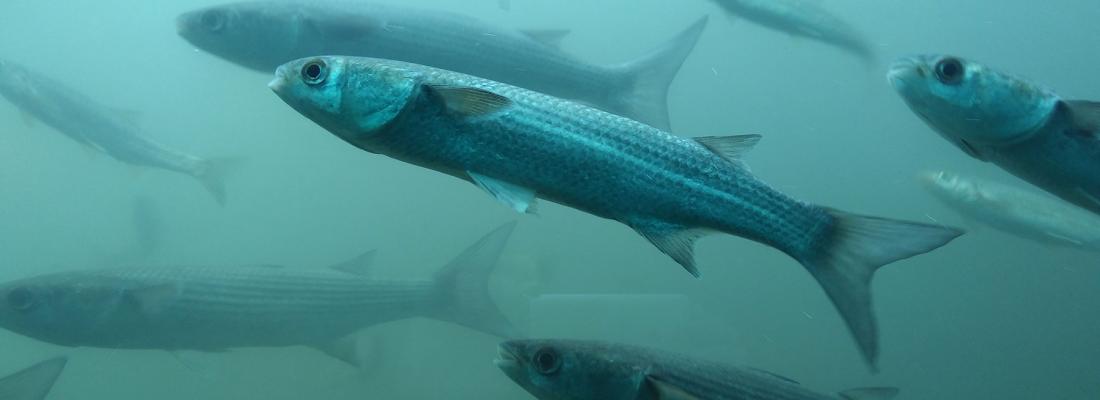Biodiversity Reading time 3 min
The DiadES project: innovative tools for the international management of migratory fish
Published on 23 May 2023

Diadromous fish (such as sturgeon, salmon, shad, eels, lampreys, mullets), whose life cycle alternates between fresh and salt water, are major contributors to aquatic biodiversity and to the cultural heritage of European coasts. In just a few decades, most diadromous fish populations have experienced an average decrease of more than 75% in their abundance. Some species are even "critically endangered" according to the IUCN (International Union for Conservation of Nature), such as the European eel or the European sturgeon. Initiated in 2019, and funded by the European Interreg Atlantic Area Programme, the DiadES project aimed to propose a new vision of the management of these emblematic species in a globally changing environment. It also aims to foster dialogue between the scientific disciplines and stakeholders involved and to promote international cooperation in favour of an enlightened management of these species and their associated ecosystem services. DiadES has brought together a consortium of researchers in ecology, environmental economics and stakeholders in five countries along the Atlantic coast (Ireland, the UK, France, Spain and Portugal).
After 4 years of study at the European level, the scientists presented the recommendations and innovative tools for a sustainable and international management of diadromous migratory fish in the context of climate change, on the occasion of a concluding meeting, organised on 23 May 2023 in Bordeaux.
To begin with, the DiadES consortium has identified 5 management recommendations which will be reported in an article published in The Parliament Magazine in spring 2023. These recommendations consist of a list of critical issues that need to be addressed in order to foster the emergence of appropriate management of diadromous fish:
- Generating shared knowledge: DiadES has highlighted the need for more in-depth research on the interconnections between diadromous fish populations and their dependence on different habitats, a more comprehensive assessment of ecosystem services including 'hidden' services and the links between where services are produced and consumed, as well as the effects of interactions between climate change and other pressures including connectivity disruptions.
- Using international coordination tools: the second recommendation aims to make better use of international coordination tools (e.g. the ICES or International Council for the Exploration of the Sea and its working groups), particularly for species for which data are scarce (e.g. river lamprey, smelt, flounder). The aim would then be to encourage concerted data collection on a supranational scale by commissioning specific work or by synthesising existing work.
- Local management measures adapted to the unexpected: the definition and implementation of management actions should integrate the territorial interdependence between fish populations on the one hand and the medium and long term imposed by climate change on the other. Management strategies on a local scale should address the ecosystem services provided by all the diadromous species present in a territory.
- Sharing this knowledge between managers: managers should share their management strategy, the status of the populations they manage, and the successes, “non-achievements” and failures of the management actions implemented locally with neighbouring management areas. For this purpose, new "arenas" need to be devised at regional, national, cross-border and international levels.
- Raising awareness, educating, communicating: an important lever for action in attempting to reverse the widespread decline of our species of interest lies in education or "acculturation". In fact, better informed and more concerned citizens could prompt managers to find a balance between socio-economic and environmental issues.
Two additional tools have been developed during the project to promote the long-term and large-scale management of diadromous fish.
The serious game DiadESland has been developed by the INRAE Nouvelle-Aquitaine Bordeaux research team with the help of the other DiadES project partners. In this educational role-playing game, players take on the role of river basin managers who are responsible for developing a management strategy over 60 years, based on biodiversity objectives and the levels of ecosystem services to be achieved. Distributed free of charge to all the project partners, and widely distributed in France and Europe through numerous game sessions, the serious game DiadESland brings together elected officials, recreational or commercial fishermen, river basin unions, researchers and other stakeholders in order to attempt the management of a river basin in the face of the threats linked to global change. DiadESland is now available in paper or digital format, and the latter allows free, remote, multi-player sessions, and offers new opportunities to disseminate to a wider audience the concepts of the management of diadromous fish in the context of climate change.
An interactive web atlas to explore the possible futures of diadromous populations based on the research results of the project has been developed with the help of the company ThinkR. The DiadES atlas aims to make the main results of the DiadES project available to a wide audience on an easy-to-use platform: the current distribution of diadromous fish populations, the ecosystem services associated with these species in each of the project's case studies, and the distribution of migratory fish up to the year 2100 on the Atlantic coast. The aim of this tool is to raise awareness of the risks of loss of resources and ecosystem services linked to climate change, while highlighting the implications of these changes in terms of territorial interactions.
References
- Interreg Atlantic Area DiadES – policy brief - a transnational and non-sectoral approach to diadromous fish species management - https://diades.eu/work-packages/
- Interactive web atlas: https://iwa.diades.org
- Serious game DiadESland: https://diades.eu/wp-content/uploads/2022/06/BOOKLET_DiadESLAND_ENGLISH.pdf
